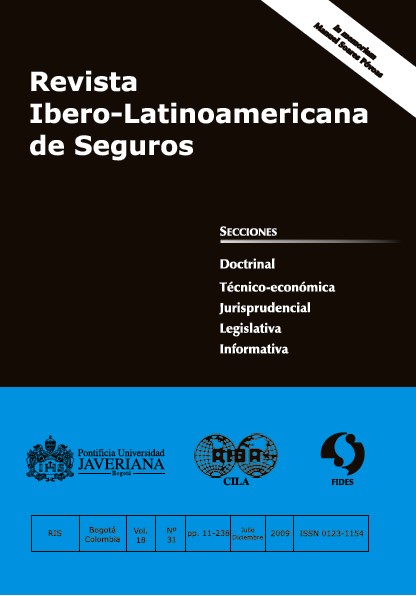Abstract
Taking into account how important the reinsurance policy is at the Latin American level and notwithstanding that there’re two types of reinsurance, the present research will focus on the facultative reinsurance as it has become necessary to address the topic as a process of reflection and thought not only from the technical standpoint but also from the practical viewpoint by reviewing particular situations such as controversies or discussions about the conditions of that policy, comments, decisions and precedents that have been key in English jurisprudence. All is presented as an assessment between Latin American reinsurance companies and reinsurance companies in the English arena (London). Hence, the review starts on the very concept of the reinsurance policy, going through its parts, its execution, the good faith principle, conditions, loss of the facultative contract and control and cooperation clauses. The emphasis on the legal nature of the contract, the reinsurance broker, the insured risk and the importance of relevant cases and the day to day development along discussions generated are in great part analyzed along with English jurisprudence, tribunals and English scholars in trying to inform about the development of the contract, its usefulness and the least positive consequences that may arise, all of which is part of this article.
This journal is registered under a Creative Commons Attribution 4.0 International Public License. Thus, this work may be reproduced, distributed, and publicly shared in digital format, as long as the names of the authors and Pontificia Universidad Javeriana are acknowledged. Others are allowed to quote, adapt, transform, auto-archive, republish, and create based on this material, for any purpose (even commercial ones), provided the authorship is duly acknowledged, a link to the original work is provided, and it is specified if changes have been made. Pontificia Universidad Javeriana does not hold the rights of published works and the authors are solely responsible for the contents of their works; they keep the moral, intellectual, privacy, and publicity rights.
Approving the intervention of the work (review, copy-editing, translation, layout) and the following outreach, are granted through an use license and not through an assignment of rights. This means the journal and Pontificia Universidad Javeriana cannot be held responsible for any ethical malpractice by the authors. As a consequence of the protection granted by the use license, the journal is not required to publish recantations or modify information already published, unless the errata stems from the editorial management process. Publishing contents in this journal does not generate royalties for contributors.


